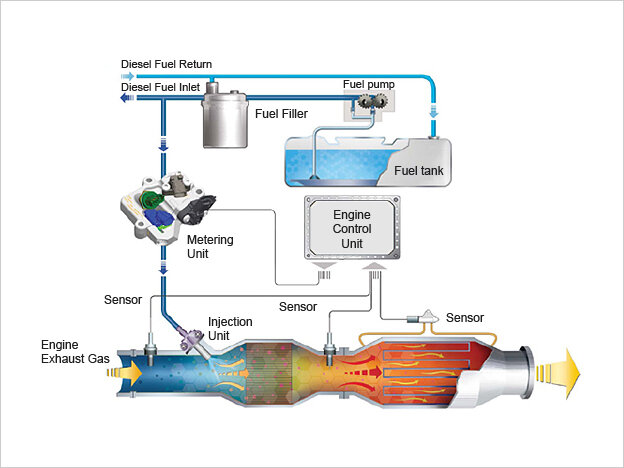
During a regen, a diesel particulate filter (DPF) cleans itself by burning off accumulated soot to prevent clogging. This regeneration process ensures optimal engine performance and filtration efficiency.
Regeneration, commonly known as a regen, plays a crucial role in maintaining the health and performance of diesel engines equipped with DPF systems. By periodically burning off the trapped soot in the filter, regens prevent blockages that can hinder engine efficiency.
Understanding how regens work and their importance in preventing engine damage is essential for truck owners and operators. Effective management of regen cycles can help avoid costly repairs and prolonged downtime. In this guide, we delve deeper into the significance of regens in diesel engines and the potential consequences of neglecting this critical maintenance procedure.

Credit: biostacklabs.com
Navigate As You Want:
What Is A Regen?
A Regen, short for regeneration, refers to the process of burning off the accumulated soot from the Diesel Particulate Filter (DPF). This is necessary to prevent clogging and to maintain the engine’s performance. If a regen does not occur when needed, the DPF can become too full, threatening both the environment and the vehicle. The engine may derate, causing potential downtime as the vehicle may be undriveable or operate at slow speeds. Failed regeneration can even result in severe consequences, such as oil quality loss and potential engine damage. It’s crucial to perform the regen process to ensure proper filtration and engine performance.

Credit: autoexpert.com.au
How Does A Regen Work?
Regen, short for regeneration, is the process in which a Diesel Particulate Filter (DPF) cleans itself by burning off accumulated soot. This essential maintenance ensures proper filtration and engine performance, preventing clogging and potential damage to the engine.
| The regen process: | The Role of the Regen Light: | The DPF Inhibit Switch: |
| During a regen, DPFs clean themselves by burning accumulated soot. | The regen light indicates when the DPF is actively regenerating. | This switch prevents a regen process from initiating. |
| Skipping regen can lead to engine derating and potential downtime. | Understanding this light’s function is crucial to efficient fleet maintenance. | Proper use of this switch can be vital in certain operating conditions. |
Importance Of Regen
A regen is a crucial process for diesel trucks, cleaning the diesel particulate filter (DPF) to prevent clogging. If a regen doesn’t occur, the DPF can fill up, causing the engine to derate and potentially leading to downtime or damage to the engine.
It’s essential for maintaining proper filtration and engine performance.
| Regeneration Process: |
| To prevent clogging, DPFs clean themselves by burning off soot. |
| Regeneration helps maintain engine performance and prevent damage. |
| If a regen is not done, the engine may derate or go into limp mode. |
Problems And Risks Of Not Regening
Engine Derating: A DPF Filter that is too full or not properly functioning threatens both the environment and the truck. The engine can derate when a needed regen does not occur, potentially causing downtime by leaving the vehicle in a state that is either undriveable or in “limp mode” where it can only operate at slow speeds.
Downtime and Limp Mode: Failed regeneration usually means extra fuel is injected into the cylinders for active regeneration, which doesn’t burn but instead drains into the sump. The results can be severe: loss of oil quality and a higher oil level. This may damage and even destroy the engine.
Damage to the Engine: A regen is a form of cleaning maintenance that ensures proper filtration and engine performance. This process is unavoidable and will eventually lead to trucks breaking down if ignored. DPF regeneration is the process of burning off accumulated soot from the DPF to prevent it from clogging and reducing the engine’s performance.
Tips For Efficient Regen
To enhance your vehicle’s performance, understanding efficient regen is essential. Regeneration helps your diesel particulate filter by burning off accumulated soot to prevent clogging and maintain optimal engine function. Engage in timely regens to avoid potential engine damage and ensure smooth operations.
Reducing Forced Regens
Reducing forced regens is crucial for optimizing the efficiency of your vehicle. By following these tips, you can minimize the frequency of forced regenerations and ensure smooth and uninterrupted driving.
|
Driving During a Regen
While it is generally recommended to avoid driving during a regen, sometimes it may be unavoidable. If you must drive during a regen, it is important to be mindful of a few things:
|
Diagnosing Regen Issues
If you are experiencing problems with regens, it is important to diagnose and address the issues promptly. Here are a few common signs of regen issues to look out for:
|

Credit: biostacklabs.com
Frequently Asked Questions On What Does A Regen Do
What Happens During A Regen?
During a regen, a diesel particulate filter cleans itself by burning off accumulated soot to prevent clogging and maintain performance.
What Happens If You Don’t Regen A Truck?
Neglecting truck regen can lead to a full DPF filter, engine derating, and potential damage. The vehicle may be left undriveable or in “limp mode,” causing downtime. Failed regeneration can result in oil contamination and engine damage. Regular regen maintenance is critical for performance and filtration.
Can You Drive During A Regen?
Yes, you can drive during a regen. Regeneration is the process of burning off accumulated soot from the DPF to prevent clogging and maintain engine performance. However, it is recommended to drive at highway speeds for at least 20 minutes to facilitate the regen process.
Neglecting regular regens can lead to engine damage and decreased fuel efficiency.
Can A Regen Damage An Engine?
A regen can potentially damage an engine if it fails or is not performed correctly. Failed regenerations can lead to extra fuel being injected into the cylinders, which can cause oil contamination and engine damage. It is important to diagnose and address any DPF regeneration issues to avoid potential engine problems.
Conclusion
To ensure optimal performance and a longer lifespan for your diesel truck, understanding the process of regeneration is crucial. Ignoring regens can lead to clogged DPF and reduced engine efficiency. The regen process is essential for maintaining proper filtration and engine performance.
Stay informed and proactive to prevent potential breakdowns and costly repairs.



